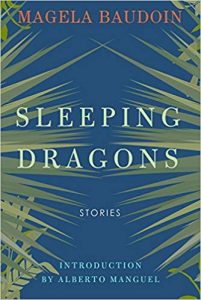Book Review
 In the slim but impactful story collection Sleeping Dragons, Bolivian writer and professor Magela Baudoin, a past winner of the Gabriel García Márquez Spanish American Short Story Award and Bolivia’s National Novel Award (Premio Nacional de Novela), unsettles and surprises as she steers her realistic narratives into unexpected and thought-provoking territory. A collection of fifteen unrelated stories, which have been translated into English by Wendy Burk and M. J. Fièvre, the short but succinct narratives focus on the everyday lives of people confronted with challenges, difficult choices, unhappy circumstances, and uncertain futures. Oftentimes, Baudoin focuses on one character and one singular event, and during the course of the narrative, the author vaguely discloses details about her character’s past, revealing painful memories, fears, and discontentment. Frequently, the reader is left to draw his or her own conclusions about the ending.
In the slim but impactful story collection Sleeping Dragons, Bolivian writer and professor Magela Baudoin, a past winner of the Gabriel García Márquez Spanish American Short Story Award and Bolivia’s National Novel Award (Premio Nacional de Novela), unsettles and surprises as she steers her realistic narratives into unexpected and thought-provoking territory. A collection of fifteen unrelated stories, which have been translated into English by Wendy Burk and M. J. Fièvre, the short but succinct narratives focus on the everyday lives of people confronted with challenges, difficult choices, unhappy circumstances, and uncertain futures. Oftentimes, Baudoin focuses on one character and one singular event, and during the course of the narrative, the author vaguely discloses details about her character’s past, revealing painful memories, fears, and discontentment. Frequently, the reader is left to draw his or her own conclusions about the ending.
In the titular story, the narrator is a young, sad, pregnant girl whose heart has been broken. Paid under the table to work as a production assistant on a documentary, she travels from La Paz to Ciudad de Piedra to film the spectacular flower spike known as the Queen of the Andes, before moving on to Curva, a mountainous region of Bolivia that is home to naturopathic healers. While the film director seeks out elusive mountains, witch doctors, and hidden areas of historic wonder, the main character trails along with disinterest, suffering from nausea and morning sickness and continually irritated by local guide Victor’s many ridiculous tales of witchcraft, magic, and fabled lost cities.
Baudoin’s descriptions of Victor and his inexhaustible supply of anecdotes and preposterous tales add nice touches of humor to the piece and help make “Sleeping Dragons” one of the highlights of the collection:
He also told us that once in Curva, at a festival, a peasant from the village of Amarete got so drunk that he started dancing and throwing sticks of dynamite up in the air until his arm was ripped to shreds. Victor said that a Kallawaya doctor bandaged the man’s stump with a rag full of herbs. “Years later I saw him again, with his stump healed beautifully,” he told us.
Surrounded by unspoiled mystical beauty and fed mythological accounts of the miraculous powers of the Kallawaya healers, the hurt and disillusioned narrator’s bitter and skeptical outlook softens throughout her journey, and her stimulating environment has a healing effect upon her. Through Victor’s subtle, ambiguous remarks at the end, however, Baudoin deliberately adds a sense of unease and confusion, making the reader wonder what the future holds for the main character and if she will actually go ahead with the pregnancy.
Other exceptional stories in the collection include “Mengele in Love,” a darkly effecting tale of a former cabaret artist turned hotel chambermaid who is bullied and sexually harassed by her manager and who reminisces about her childhood affair with an old and vile German war criminal. While in “Something for Dinner,” the opening story, the focus is on the recklessness of three thirteen-year-old friends who accidentally crash a car. Told from the point of view of one of the boys’ sisters, it starts out as a candid memoir describing her childhood and her “cold as ice” mother and car-obsessed brother. The rather pedestrian narrative rapidly turns into a disconcerting tale of misadventure, with Baudoin chronicling the disastrous car accident and the repercussions for the families involved.
At times, the open-ended nature of Baudoin’s stories has the effect of making a narrative seem unfinished and crying out for resolution. Argentine-born writer, translator, and editor Alberto Manguel addresses this issue in his introduction, writing: “We come to the last page of a Baudoin story and we ask ourselves, what exactly just happened?” Time and again throughout the collection, you find there is always more to the story than Baudoin is willing to reveal, and by the end, we are left with an unclear take on things, a feeling that, as Manguel notes, something essential seems to have escaped us.
That said, what makes Baudoin’s atypical writing so distinctive and so critically appealing is her eloquence and subtlety, and her willingness to leave things unsaid and allow readers to interpret a story for themselves. Largely ominous and somber in tone, the concise, intelligent fiction contained in Sleeping Dragons will move, intrigue, and not fade quickly from memory.
About the Reviewer
Nicholas Litchfield is the founding editor of the literary magazine Lowestoft Chronicle, author of the suspense novel Swampjack Virus, and editor of seven literary anthologies. He has worked in various countries as a tabloid journalist, librarian, and media researcher. He writes regularly for the Colorado Review and his book reviews for the Lancashire Post are syndicated to twenty-five newspapers across the UK. He lives in western New York.